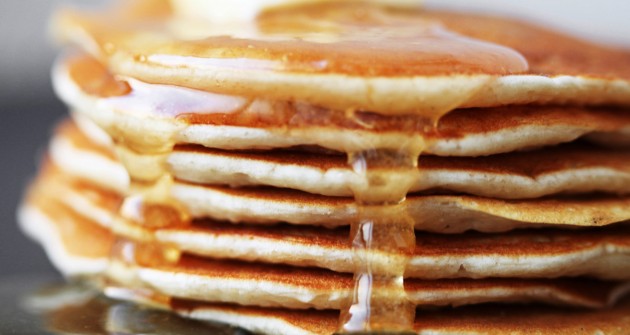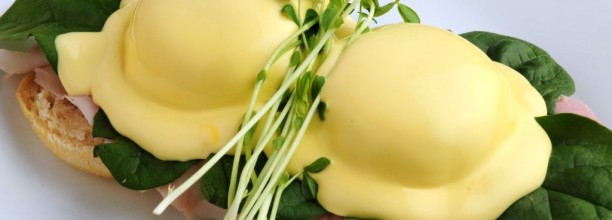
Brunch
noun
a late morning meal eaten instead of breakfast and lunch.
Origin
late 19th century: blend of breakfast and lunch.
The 1896 supplement to the Oxford English Dictionary cites Punch magazine which wrote that the term was coined in Britain in 1895 to describe a Sunday meal for “Saturday-night carousers” in the writer Guy Beringer’s article “Brunch: A Plea” in Hunter’s Weekly’
Instead of England’s early Sunday dinner, a postchurch ordeal of heavy meats and savoury pies, why not a new meal, served around noon, that starts with tea or coffee, marmalade and other breakfast fixtures before moving along to the heavier fare? By eliminating the need to get up early on Sunday, brunch would make life brighter for Saturday-night carousers. It would promote human happiness in other ways as well. “Brunch is cheerful, sociable and inciting.” Beringer wrote. “It is talk-compelling. It puts you in a good temper, it makes you satisfied with yourself and your fellow beings, it sweeps away the worries and cobwebs of the week.”
– William Grimes, “At Brunch, The More Bizarre The Better” New York Times, 1998
It is sometimes credited to reporter Frank Ward O’Malley who wrote for the New York newspaper The Sun from 1906 until 1919, allegedly based on the typical mid-day eating habits of a newspaper reporter.
Brunch is Genius
Never wake up too late for a meal, Brunch, Hung-over, Brunch, early glass of booze with your bacon and eggs, Brunch, hang with friends to reconstruct the night before, Brunch, want eggs late or steak early, Brunch.
If there is anything more intimate, pleasurable and enjoyable than a long, lazy Brunch with friends then you simply wouldn’t be able to do it outdoors, (although you might all talk about it later say, whilst masticating over Brunch!)
An Ode to Brunch
“Tell me what you eat, and I shall tell you what you are.”
Jean-Anthelme Brillat-Savarin: ‘The Physiology of Taste’ (1825)
Brunch is without question the most civilized of all concepts of eating, yet it is culinary, social rebellion personified. Brunch will not rise early for a morning jog and some roughage with the breaking day, brunch will not wait for the sun to go over the yard arm and announce a respectable hour to commune with liquor. Brunch will not be hurried, nor conform to a particular appointment, no one ever raced to a quick Brunch appointment before heading off to their next meeting. Brunch is a semi-formed concept where you straggle in when you are physically able, graze as slowly and for as long as you like and leave when you are sated, quenched, when you feel absolved of your sins, once dear friends have warmed your heart, when your mind is at peace with the world and you feel cleansed in your soul. Brunch is reflection, repair and resurrection.
Brunch is communion; with family or friends, gone are the formalities and expectations that come with dinner, or the awkward and impossible notion that is an informal lunch, Brunch says, just come if you want and arrive when you like, wear whatever you can lay your hands on, eat whatever you feel like, drink whatever takes your fancy, sate your allotriophagy and take your time about it. Brunch says, relax and perhaps, if you feel like it, let’s talk about whatever we like, whimsical and silly, philosophical and epic, there is no family crisis or broken heart that cannot be solved or resolved over a good, long Brunch.
Brunch is an oasis; breakfast, lunch and dinner are part of our daily routine but Brunch exists somewhere beyond these parameters, it 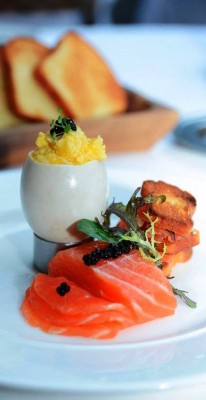 is the meal of the Lotophagi, a languid, indolent and dreamy grazing. It is a portal to another dimension, one that lies beyond the stresses and hustle of our worldly samsara, where we can escape to a form of gastronomical meditation that transcends the nausea of daily existence. Brunch is where time stops for us and nothing exists beyond the boundaries of our little garden of nirvana, our table setting, the fluffy, bitter/sweet consistency of the hollandaise sauce, drizzled lovingly over the perfectly poached eggs and Canadian bacon of our Benedictine viands, the creamy, frothy truth of a strong café latte and the spa like absolution that is a glass of morning prosecco.
is the meal of the Lotophagi, a languid, indolent and dreamy grazing. It is a portal to another dimension, one that lies beyond the stresses and hustle of our worldly samsara, where we can escape to a form of gastronomical meditation that transcends the nausea of daily existence. Brunch is where time stops for us and nothing exists beyond the boundaries of our little garden of nirvana, our table setting, the fluffy, bitter/sweet consistency of the hollandaise sauce, drizzled lovingly over the perfectly poached eggs and Canadian bacon of our Benedictine viands, the creamy, frothy truth of a strong café latte and the spa like absolution that is a glass of morning prosecco.
Brunch as an antidote for frustration: Seneca was the father of Stoicism and an advisor to the insane Roman emperor Nero, he was deeply interested in the source of anger and frustration and concluded that the source of all frustration was the collision between the real world and our expectations of it. The world and all of its phenomena go on being and acting as they are but, when they do not act in accordance with our belief in the way they should act, we become frustrated and at times, even angry. Seneca felt that the wise should start each day with the thought: Fortune gives us nothing which we can really own. Nothing, whether public or private, is stable; the destinies of people, no less than those of cities are in a whirl…We live in the middle of things…Reckon on everything, expect everything. The sanctuary of a contemplative Brunch, alone in a tranquil garden or a quiet corner in a café can give us the time and space to look back at the world and reflect on its nature, allowing us, from this calm inlet amidst the turbulent swell of life’s ocean, to reconcile within ourselves the world as it is and the world as we see it: We may be powerless to alter certain events, but we remain free to choose our attitude towards them. It is in our spontaneous acceptance of necessity that we find our distinctive freedom. Brunch is freedom.
Brunch is glossophagine; we eat brunch lovingly, we eat with our tongues, not as reptiles but as sensual creatures, as Eve licked the apple in such a manner as to convince Adam to forgo eternal life for a moments carnal passion or, like that unforgettable first time we felt the flesh of a freshly shucked oyster -sliding across our quivering tongues and forever into our dreams. We eat Brunch with our friends, our family, our lovers. Food tastes better at Brunch, we fall in lust over dinner, we fall in love over Brunch, dinner is a commitment, Brunch is because we want you.
Brunch is ossivorous; we gather as the walking dead after a long night, we come to pick over the bones of the night before, we chew on the marrow of our conspiracy, confirm our hazy recollections, resolve our guilty pleasures, repair shattered images, absolve ourselves of our sins and mostly laugh and feel good again and bask in the warmth of our friendship.
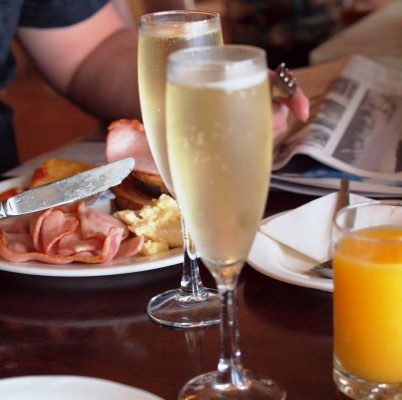
Brunch is inspiration; Marcel Proust rediscovered in an instant –the moment a biscuit dunked in tea touched his lips- the fondest, most touching and yet, somehow lost memories of his childhood. In doing so, he unlocked his creative force. The experience informed his inspiration to write ‘In Search of Lost Time’ a novel described by W. Somerset Maugham as the ‘greatest fiction to date’ and prompted Graham Greene to nominate Proust as the ‘greatest novelist of the 20th century’.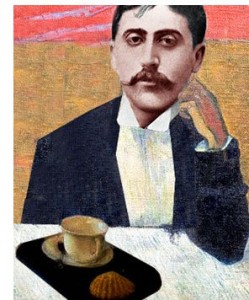
No sooner had the warm liquid mixed with the crumbs touched my palate than a shudder ran through me and I stopped, intent upon the extraordinary thing that was happening to me. An exquisite pleasure had invaded my senses, something isolated, detached, with no suggestion of its origin. And at once the vicissitudes of life had become indifferent to me, its disasters innocuous, its brevity illusory – this new sensation having had on me the effect which love has of filling me with a precious essence; or rather this essence was not in me it was me. … Whence did it come? What did it mean? How could I seize and apprehend it? … And suddenly the memory revealed itself. The taste was that of the little piece of madeleine which on Sunday mornings at Combray (because on those mornings I did not go out before mass), when I went to say good morning to her in her bedroom, my aunt Léonie used to give me, dipping it first in her own cup of tea or tisane. The sight of the little madeleine had recalled nothing to my mind before I tasted it. And all from my cup of tea.
—Marcel Proust, In Search of Lost Time
The Author J. K. Rowling suffered from clinical depression, she penned the first volumes of her literary phenomenon, Harry Potter whilst lurking in cafes around Edinburgh, over café lattes and the occasional Brunch. Brunch has the ability to unlock the power of our own imaginations, our own creativity and ideas, with a good Brunch, anything is possible.
Brunch is Happiness; the Ancient Greek Philosopher Epicurus reflected deeply on happiness, he even created a university of hedonism to study the source of human happiness. Epicurus came to understand that in error, we replace emotional needs with commercial wants, which ultimately leave us unsatisfied, As the author Alain de Botton reflects, It may be a ‘Jeep’ we end up buying but it was –for Epicurus- freedom we were looking for. It may be the aperitif we purchase but it was –for Epicurus- friendship we were after. It may be the new bathing salts and oils we acquire but it was –for Epicurus- thought that would have brought us calm.”
Thus Epicurus devised his list of needs for personal happiness: Bread, Water, a Pot of Cheese, Wine and Friendship. Brunch is the most relaxed and perfect of settings to break bread, drink water or wine, enjoy good food, even cheese and to share it with friends, in the truest sense of Epicurean ontology it is the perfect recipe for happiness.
Brunch is faith and potential, Brunch can be anything it desires, a Champagne brunch is the Brunch of hedonists and butterflies, a Midnight Brunch is the Brunch of adventure and daring, a Sunday Brunch is a Brunch for communion and consolation. Where there is Brunch there is hope and there is possibility and all is right with the world. Let there be Brunch.
Darren W. Gall
